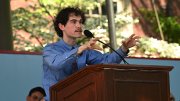“Class Day does not traditionally include a moment like this,” said senior program marshal Tarina Ahuja ’24 an hour into this year’s Class Day ceremony. “But we’re also not living in a typical moment.”
After earlier speakers referenced the class of 2024’s “resilience” in the face of challenges—including fierce debates about the limits of academic freedom and free speech amid the Israel-Gaza War—Ahuja directly addressed the fifteen members of the class who were found by the Administrative Board to have violated University policy during their participation in a pro-Palestinian encampment in Harvard Yard. Until today, it was unclear whether those students would graduate tomorrow: although they faced disciplinary charges, the Faculty of Arts and Sciences voted Monday that they should be included on the list of those eligible to graduate. Today, the Harvard Corporation ruled that the students, because they are “not in good standing,” will not receive their degrees tomorrow after all.
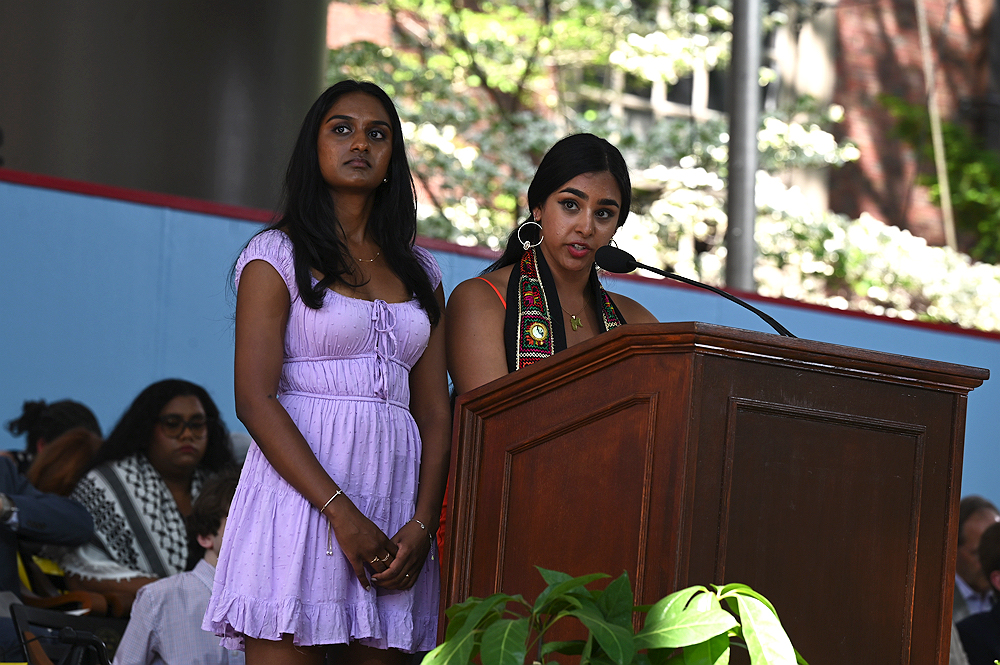
“Though we all have different opinions, as we’re entitled to, they are members of our class, like the rest of us,” Ahuja said. “We want to acknowledge and take time to recognize that they have been unable to celebrate their senior week and Commencement, and to participate in the jubilance of graduation in the same way as the rest of us.” To cheers from the crowd, Ahuja and fellow program marshal Shruthi Kumar ’24 read the first names of thirteen of those seniors. (Two chose to remain anonymous.)
This year’s Class Day was an unconventional one. After struggling to secure a speaker, the Harvard Alumni Association and senior class committee ultimately asked two people to address the class. Those selected—dean of admissions and financial aid William R. Fitzsimmons ’67 and Currier House security guard Bill Oliverio—stood in stark contrast to the high-profile politicians, actors, and entertainers who often speak at Class Day.
The ceremony also included three student speakers instead of the usual two: Jeremy Ornstein ’24 delivered special additional remarks that addressed the campus climate. He started with an anecdote, remembering a time when he was hosting a disco party in his dorm room while students on the floor below were trying to study. Eventually, those students came upstairs to ask the partiers to quiet down. Hearing the commotion, a cello player from across the hall came out to see what was going on, and someone convinced him to play a Bach suite. “So we all sit on the stairwell, shoulder to shoulder… disco dancers in glitter makeup sitting next to bleary-eyed pre-med students,” Ornstein remembered. “This happens at Harvard more than you know: a bunch of brilliant, stubborn people in a really small space, naturally colliding.”
Such collision can lead to anger and tension—but can also be productive, Ornstein said. “This is not a new idea. Reverend Martin Luther King, Jr. said many times that creative tension is the way to help a society grow,” he said. “At Harvard, leaders have said the same thing. In 1903, Professor William James called on us to be ‘undisciplinables’. He meant follow your ambitions and your ideals…even if you break some rules. In 2024, I am proud of us undisciplinables, including the people who speak out against the killing of innocents, even when it is unpopular—no matter who or when or where.”
He also praised what he called “‘unlikely inseparables’—people who stay together even when they disagree,” he said. “People who, when you see them in the dining hall, you think, ‘How can those people be friends?’” In his own College experience, he’s had relationships like this, he said, and witnessed the ability of those who disagree, sometimes vehemently, to speak to one another. He called on the University to provide forums for such conversation. “Harvard University, I invite you to embrace public conversation… Where are we spending our money? Who are we hiring?” he said. He challenged students and faculty to have such conversations publicly, with people who might disagree: “Do it in town halls, face to face, because we can take it. Because we are capable of that.”
After Ornstein’s speech, College Dean Rakesh Khurana participated in a standing ovation that swept the audience and those sitting on stage. Earlier during the ceremony, he, too, had addressed “intellectual vitality and academic freedom,” asking students to “resist the binary and embrace complexity.”
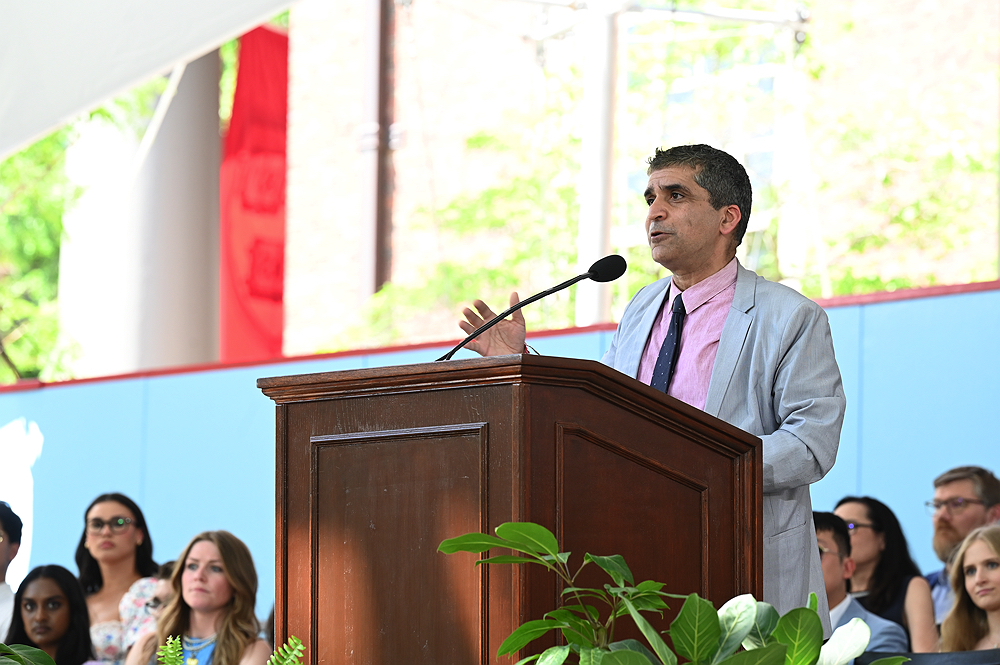
“When we embrace binary thinking, our observations become simplified. We stop making room for complexity, for continuums, for multiple perspectives. Our reasoning and critical thinking shut down,” he said. “It may seem like we’re expressing moral clarity when we identify our position on the binary: good and not evil, on the right side of history and not the wrong side. But if we reach moral clarity without the pursuit of truth, the careful examination of other perspectives and as a thoughtful engagement with each other, we have only reached a starting point—not a final destination.”
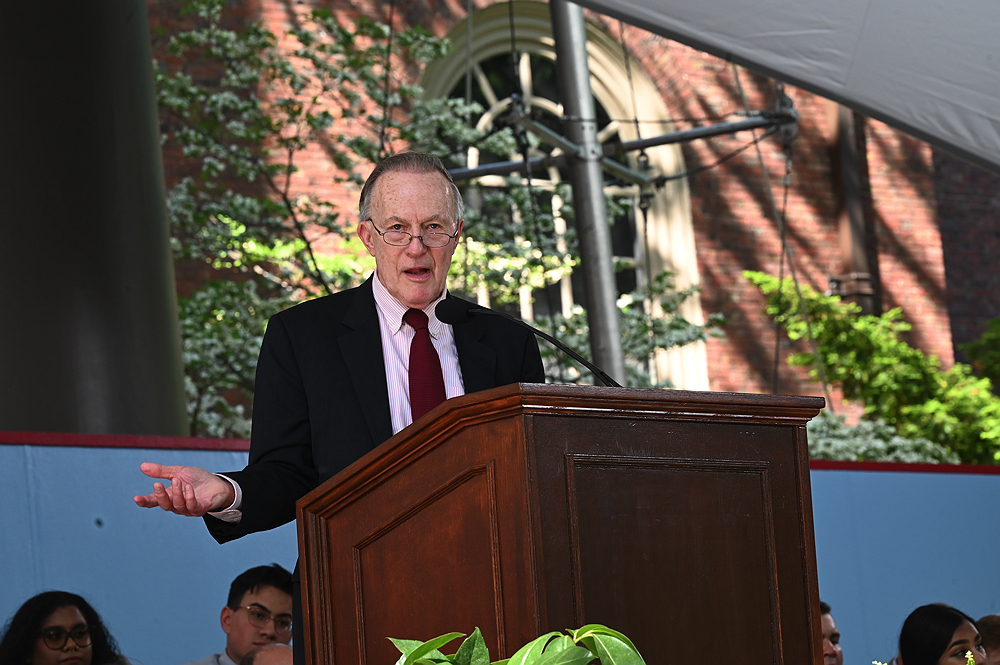
After the student speakers, featured guest Fitzsimmons spoke about the importance of diversity of background and perspectives on a college campus. The first in his family to attend college, Fitzsimmons remembered the Harvard he attended as a student, when women couldn’t use Lamont Library, there was little racial diversity, and only a quarter of students were on financial aid—as compared to 55 percent who receive such aid today. He praised the work of fellow admissions officers and various presidents, including Lawrence H. Summers, who started a financial aid initiative. He also remembered when Drew Faust, during the 2008 financial crisis, prioritized financial aid: “We’re going to have to cut back on a lot of things,’” he recalled her saying. “‘But the one thing we will not cut back on is foundational to who we are—and it will be financial aid.’” He also praised “the moral compass” and “grace under pressure” of Larry Bacow and Claudine Gay, “who did an amazing job… when we were reinventing Harvard every day” amid the pandemic.
The second featured speaker—Securitas employee Bill Oliverio, who works as a security guard in Currier House—reflected on the relationships he’s developed with students throughout his 14 years of work at the University. When he first started at Harvard, “I thought, ‘Great, I’m going to be watching spoiled rich kids,’” he remembered. That perspective changed as he “saw [students] when no one else was watching,” he said. “At some point… [security guards] become like furniture; we’re just there. You guys are cool with us, and you can just be yourselves.”
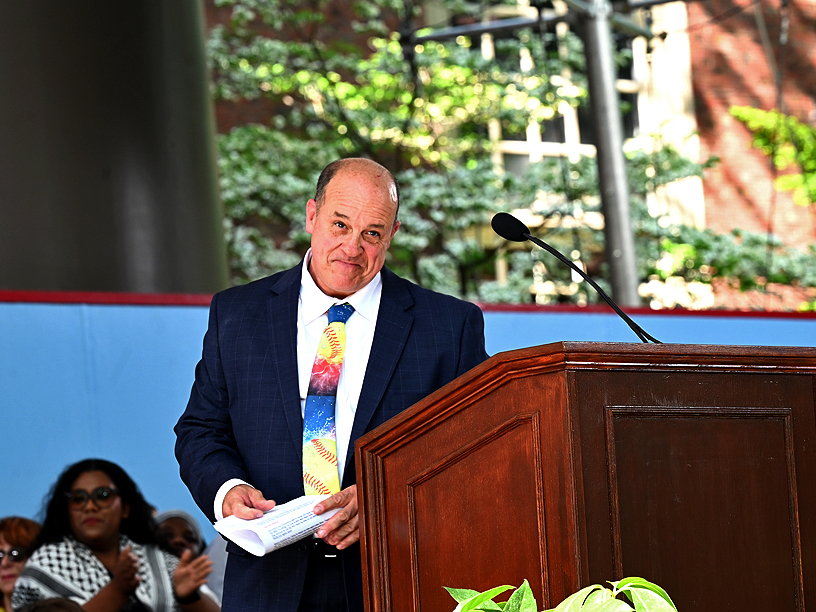
When he received the invitation to speak at Class Day, he said, he was initially uncertain. “I was presented with the idea and given the opportunity to back out,” he said. “Speaking’s not my thing. But then I thought about it, and I realized it wasn’t an opportunity. It was an obligation. Shame on me if I pass up the opportunity to tell all these parents what I’ve been telling all of you guys for the last 14 years.”
One of those messages was a quip he often makes—sometimes sarcastically, as when students lock themselves out of their rooms—that he’s a security guard for “the smartest kids in the world.” At the end of the speech, he returned to that idea: “The question begs to be asked: are you guys really the smartest kids in the world? I don’t know,” he said. “What I do know: you’re the greatest kids in the world.”
